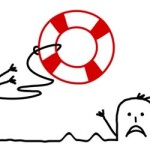
Oliver Burkeman addresses the monkey that rides on our shoulder whispering “You didn’t get enough done today – certainly not as much as we should have, could have.”
Nothing to Prove
By Oliver Burkeman, from The Imperfectionist
I think a bit too often, if I’m being honest, about the closing scene of episode two of Aaron Sorkin’s TV-show-about-a-TV-show, Studio 60 on the Sunset Strip, which got ignominiously cancelled after a single season. (You can watch the scene in question here.)
Matthew Perry and Bradley Whitford play executive producers called in to rescue and relaunch a weekly live sketch show, a thinly disguised version of Saturday Night Live, and the episode follows their high-stress efforts to pull it together in a week. The anxiety builds as a huge digital clock on the control room wall counts down the days, hours, minutes and seconds to the moment they’re due on air. The world – well, the media world – is watching. The stakes are high. Last-minute crises and conflicts threaten to derail the whole thing.
But they manage it: the show goes live, the opening number ends, the studio audience goes wild, and the camera cuts to Perry, watching from the back. For the first time, his expression isn’t tense, but relaxed. He’s satisfied, proud, absorbed in the spectacle. Against the odds, things are OK.
…For about one second. Then a troubling thought strikes him, the tension returns to his face, and the camera follows his gaze to the countdown clock on the wall. It now shows six days, 23 hours, 57 minutes and 53 seconds: the time they’ve got left in which to do it all over again next week.
I doubt I’m alone in feeling as if I know exactly what Perry’s character is going through here. I’ve written before about the sense many of us have that we begin each morning in a state of “productivity debt”, which we must struggle to pay off over the course of the day, if we’re to feel by the evening like we’ve earned our spot on the planet. (“Few things feel more basic to my experience of adulthood,” I wrote, “than this vague sense that I’m falling behind, and need to claw my way back up to some minimum standard of output.”)
Many days, you end up feeling like you failed to pay off this mysterious existential debt. But the days when you succeed – when you do make it through your to-do list, or do conquer the accomplishment that seemed so consequential at 8am – aren’t really all that much better, because the satisfaction is so fleeting. A new day will soon dawn, after all. The debt will reset. The rock will roll back down the hill. The countdown clock will starts ticking again.
(Not that this is something that only happens on a daily rhythm: it’s familiar in the context of long-term goals, too. You drive yourself hard for years trying to ace an exam or get a promotion – only to discover that the feeling you experience when you succeed, the sense that all’s well with the world at last, persists for about a week, if you’re lucky.)
The trouble is that what we think we’re doing, whenever we’re busying ourselves trying to pay off productivity debt, is working diligently towards a moment in the future when everything will feel OK: when we’ll have staved off catastrophe once and for all, or fulfilled our potential, or justified our existence. (The details vary widely, because the ways in which people are screwed up varies widely, too.) Whereas what we’re actually doing is reinforcing a psychological pattern in which we take our basic sense of adequacy to be dependent on making the best use of our time.
And that’s an unwinnable battle, because as long as you remain alive, more time is always going to be opening up, day after day – time that, according this logic, you’ll have to use as effectively as possible too. So even though the whole endeavor is motivated by a desire to finally relax, in fact you never get to relax, until you’re dead and your time is no longer being replenished. (And being dead is a little too relaxed for my tastes.)
The alternative – easier said than done, I know, but I’m not sure there’s a third option here – is to contemplate the possibility that peace of mind, and your general sense of adequacy as a human being, might be things that you started with, as opposed to things you started without, and then needed to achieve through your efforts.
It’s hard to make a perspective shift like this through willpower alone. But you can ease your way into it, in fits and starts. What if – just for the remainder of this week, say – you were to proceed on the basis that the quest salvation-through-productivity was never going to work (it hasn’t done so far, after all). And that it might never have been necessary to begin with?
In his interesting book Redeeming Your Time, the Christian writer Jordan Raynor points out that in Christianity, this idea takes the form of grace: the principle that God “offers you peace before you do anything.” You don’t accomplish things in life in order to attain peace; that’s unnecessary, indeed hubristic. You accomplish them as “a response of worship” to the peace you’ve already been given, deservedly or not.
I don’t share Raynor’s religious convictions, so I’m not bringing this up in order to suggest that anyone else adopt them. But when I think about it, I’m obliged to concede that the opposing view – the culturally dominant one that says you do need to accomplish things in order to achieve a baseline level of OK-ness – is certainly no more rational or logical or scientific. There are no real grounds for it. Letting go of it, at least for a little while, is as easy as remembering that I can do so.






























